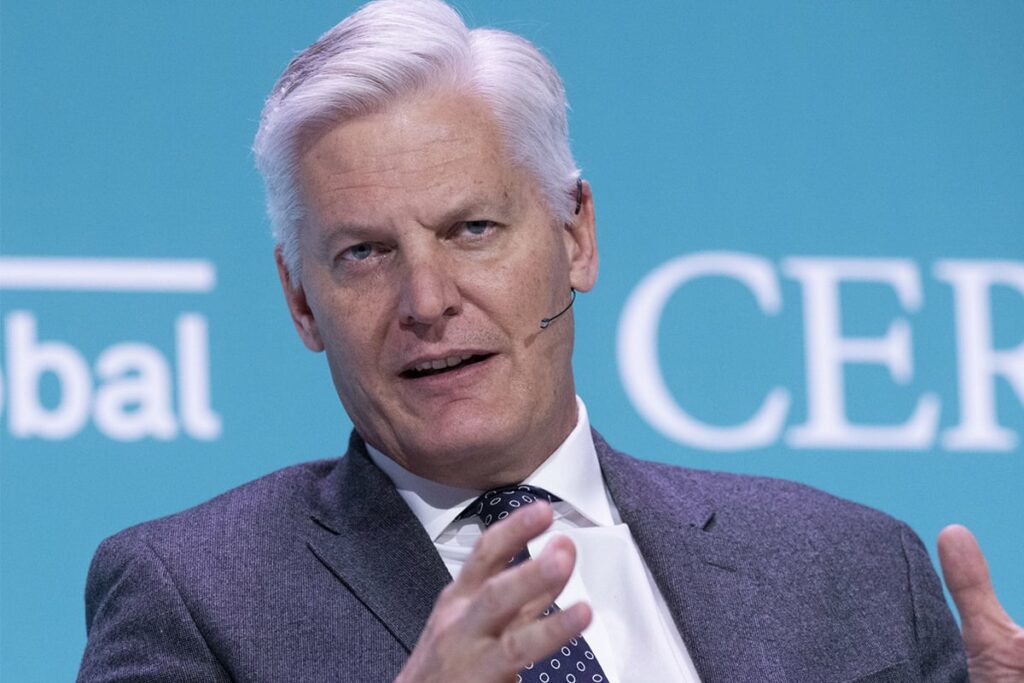Former Eskom CEO André de Ruyter has acknowledged Eskom’s decline, stating its days of providing affordable, reliable electricity are over. Despite efforts to revive it, he deems Eskom unfixable in its current state. De Ruyter advocates for restructuring, with transmission remaining public while generation shifts to the private sector. Economist Dawie Roodt concurs, foreseeing Eskom’s demise akin to other state entities. He predicts a future where private hands dominate electricity generation and distribution, leaving transmission as a state-owned utility.
Sign up for your early morning brew of the BizNews Insider to keep you up to speed with the content that matters. The newsletter will land in your inbox at 5:30am weekdays. Register here.
By Staff Writer
Former Eskom CEO André de Ruyter says Eskom’s glory days are long gone and that people should forget about affordable electricity that is always available.
De Ruyter told delegates at the PSG Financial Services Annual Conference that Eskom was in poor health when he joined as chief executive in January 2020.
He soon realised that the power utility was “a patient just about in terminal decline”. Despite his best efforts, he could not fix Eskom.
De Ruyter said he failed because Eskom is not fixable in its current form. He added that the utility cannot be resurrected to its former glory.
For 85 years, the power utility provided South Africa with reliable, affordable electricity. It was a well-run company that supplied more than half of the electricity in Africa in 1990.
Read more: Power struggle: Eskom takes Joburg’s City Power to court over R1bn owed
Eskom even won the Power Company of the Year at the Global Energy Awards in 2001, showing just how great a power utility it used to be.
However, when he took the helm, De Ruyter encountered numerous operational and financial issues. These included non-paying customers, like municipalities refusing to pay.
“All those things conspired to make this a difficult challenge,” he said.
These comments align with De Ruyter’s previous warning that South Africans must abandon their nostalgia for when Eskom produced cheap, always-available power.
He told Nuuspod, “That time is gone. I don’t think we’ll see it again.”
De Ruyter added that Eskom will be restructured and unbundled into three divisions — generation, transmission, and distribution.
In future, Eskom will essentially be a transmission company. The private sector will handle generation, while municipalities will handle distribution.
The private sector has more money and resources and is more capable and efficient at generating electricity than Eskom.
Read more: Eskom forecasts reduced loadshedding for winter months
This means the private sector will be able to supply electricity to South Africa more efficiently and cheaply than Eskom currently does.
De Ruyter urged the government to avoid sinking too much money into Eskom’s ageing and deteriorating coal-fired power stations.
Instead, the money would be better spent extending the utility’s transmission grid to allow the private sector to take over generation.
Renowned economist Dawie Roodt shares De Ruyter’s view, saying Eskom will go the same way as the SA Post Office and South African Airways.
He said Eskom is essentially being privatised, but not through official government policy. Instead, the private sector is simply generating its own electricity.
“Eskom is poorly managed and cannot provide reliable electricity. The private sector is stepping in to fulfil this duty,” he said.
Roodt said the government is not good at running anything, leading to the power utility’s demise.
“Eskom has already lost a third of its market. It will continue to lose customers and eventually come to an end,” Roodt said.
Read more: Eskom’s load-shedding respite spurs doubts over diesel use ahead of elections
Although Eskom’s generation business is set to die a slow death, its transmission network will survive and remain in state hands.
Building a national electricity network is very costly and time-consuming, and this is where a state utility makes sense.
“The transmission network is a natural monopoly. The state will most likely remain the owner of this network,” Roodt said.
He likened it to a highway. “It is not possible to compete against a natural monopoly,” he said.
Roodt predicts that the distribution networks will also become privatised despite pushback from municipalities that make lots of money from these networks.
In future, electricity distributors will buy electricity from where they can get it the cheapest and sell it to where they can get the best price.
“The generation and distribution parts will be in private hands, which has happened in many countries worldwide,” Roodt said.
Read also:
André de Ruyter: More Truth to Power
Eskom report says SA’s rooftop solar generation doubled in two years
Eskom’s diesel dependency: Analyst urges shift to sustainable energy
This article was first published by My Broadband and is republished with permission
Visited 1 times, 1 visit(s) today
>>> Read full article>>>
Copyright for syndicated content belongs to the linked Source : BizNews – https://www.biznews.com/energy/2024/05/10/de-ruyter-says-eskom-unfixable
